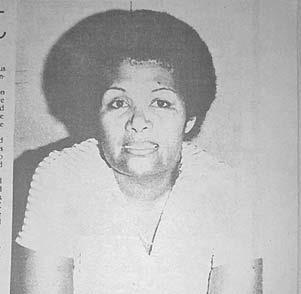The first woman senator of Fiji and the chairman of the Consumer Council of Fiji, Anaseinì Qionibaravi, had done an amazing job in seeing that every consumer received value for their hard earned money, while keeping away from the harms of people of exploitation and advised members to be more vigilant.
Ms Qionibaravi had dedicated herself to the consumerism, a relatively new field that was so far neglected.
This was reported by The Fiji Times on May 22, 1976. She was striving for the main source of a high standard of products produced in Fiji and the of the quality of the goods that came from overseas.
Also, to study the fluctuations of the market and abettors influencing them, also to advise or make recommendations to the Government and organisations concerned.
For far too long, the consumer movement was thought as something special for advanced countries only.
In the post-war decade of 1950s consumerism has developed rapidly spreading to Australia and Pacific Island countries.
“ln a developing country such as Fiji, it is important that the standard of living is striving, and that the costs, quality and accuracy of quantity should be maintained,” she said.
Ms Qionibaravi investigated complaints about poor quality products, frauds, rackets, false and misleading advertisements.
“I hope to press for better ways to protect the rights, health and interests of consumers,” she said.
Ms Qionibaravi received several complaints each day, but it seemed that more of these complaints came from tourists and she did not hesitate to raise her voice loud and clear for their protection
She felt that the consumers were at a disadvantage when manufacturers held monopolies. Because of their monopolistic position, they could fix whatever profit margin they wish.
She also stressed on having consumer education programs in schools.
“Young people should understand their role as consumers and become responsible buyers. In Fiji, the people are changing from a rural economy to a cash or Western-type of economy.”
“Therefore, the burden of being vigilant was heavier on the rural people.”
In most countries consumer councils were independent non-political bodies.
However, Ms Qionibaravi fortunately happened to be Fiji’s first lady Senator and frequently received all sorts of invitations from other countries regarding her involvement in safeguarding consumers.
“I went to Australia and the United States to be in touch with consumer organisations.”
Born in Bua 37 years ago, Ms Qionibaravi received her primary education at St Mary’s School, Labasa, then joined Adi Cakobau School and obtained School Certificate.
“I decided to become a teacher and after spending a year at the Nasinu Teachers College I left for Auckland Teachers’ College on a government scholarship for two years, specialising in home economics.”
On her return, she taught at numerous schools including Ratu Sukuna Memorial and Adi Cakobau for eight years. In 1969, she stopped teaching and accepted a job with Radio Fiji and ran a woman’s program in English.
“On independence in October 1970,I was appointed to the Senate as one of the nominees of the Prime Minister.”
Ms Qionibaravi was the only woman in the Senate with a total of 21 men. “One of the most satisfying realisations was that women were being recognised at this level, so I was more or less, a spokesman on women’s affairs.”
In adjusting to her new environment, the Senate was established in the Fiji Government, with no previous experience as she had to set a pattern as to how the Senate would function effectively.
“A house where members would debate the issues from the national point of view rather than from a political point of view was set up,” she said.
With Ms Qionibaravi’s interest in home economics and community service, she was appointed the first chairman of the Consumer Council in 1971.
“The Government felt by educating consumers, people would be made more aware of their personal roles and thus take pressure off the Government.” Consumerism may function quite differently in Fiji where shops were few and scattered and the range of items was limited when people bought the essentials in rural areas.
“If I had the choice, I’d rather work in the rural areas and educate the villagers to budget and buy wisely.”
In 1972, Anaseini visited Auckland, Wellington and Christchurch for three weeks at the invitation of the NZ Consumer Council to study the work of well-established consumer organisations there. In March 1973, Ms Qionibaravi spent three weeks travelling around India.
The Consumer Council of Fiji was a member of the International Organisation of Consumer Unions (IOCU) whose headquarters is in The Hague.



